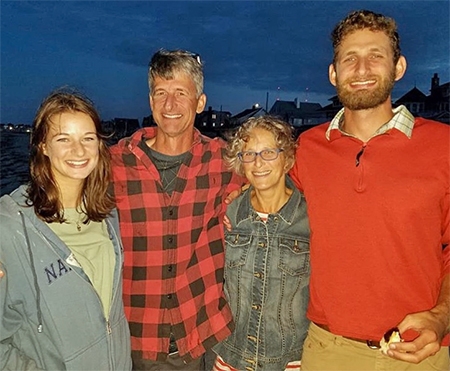Emily Monosson '83
MAJOR: Biological sciences
CURRENT POSITION: Independent toxicologist, author
Inspiration can strike in the most unexpected places – like a meeting of the Society of Environmental Toxicology and Chemistry.
Emily Monosson ’83 was attending such a meeting in the mid-2000s. At the time, the independent toxicologist conducted research on a variety of projects with a variety of entities. But Monosson was part-time. She worked 20 hours a week while caring for her two young children.
This befuddled the name tag maker at the meeting.
“I was proud of having no official affiliation and flexibility so I could pick the kids up from school, but still produce meaningful work,” said Monosson, who studied biology at Union. “When I was asked for an affiliation for my badge, apparently the machine couldn’t print a badge unless all the fields were filled out.”
“So I put housewife. It was an eye-opener,” she continued. “With that affiliation, I had become invisible. People looked right past or through me. This is when I became aware not of any bias against women, but against part-time science moms and those who are not affiliated with a known organization. I was probably guilty of the same before I’d had kids and changed how I did science.”
The experience inspired her first book, Motherhood, the Elephant in Laboratory: Women Scientists Speak Out (2008, Cornell Press). In it, 34 women (including Monosson) – from physicists to paleontologists – discuss managing careers and motherhood.
“I felt like I was alone, trying to balance career and kids and deciding to take a nontraditional path through science. There is a lot written about this now, but there wasn’t then,” Monosson said. “I wanted to change the perception that people who are part-time or take time off are less dedicated to their science or career. I wanted to have a discussion about it.”
“Also, anyone choosing to work outside academia in science was considered a ‘drop-out’ and in some circles they still are,” she added. “I wanted to show this isn’t true. That actually having scientists out there – from the playground nature group to administration in academia – is good for the whole scientific community and beyond.”
Motherhood marked the start of another chapter in Monosson’s career – melding her technical expertise with writing for more general audiences. Her books include Natural Defense: Enlisting Bugs and Germs to Protect Our Food and Health (2017); Unnatural Selection: How We Are Changing Life, Gene by Gene (2014); and Evolution in a Toxic World: How Life Responds to Chemical Threats (2012).
“I write about toxicology because there was and is so much misinformation about chemicals in consumer products, in our homes and so on,” Monosson said. “I also want to educate readers about toxicology – what we study, how and why it matters. Whether pharmaceuticals or industrial chemicals, these impact all of us and the environment, often in ways we could have never imagined.”
“I also want to get people thinking about what we can do to solve some big problems,” she added. “Whether through individual actions or larger efforts like reduced antibiotic use and more sustainable farming.”
Monosson, who occasionally teaches classes in environmental toxicology at the University of Massachusetts (Amherst), was drawn to toxicology at a young age.
“I was interested in how the body works, right down to what’s happening in the cells. This came in large part from studying biology at Union,” she said. “It was so cool to think about what was happening from limb to cell. I was also interested in environment and health, so toxicology was a great combination of all this.”
Biology Professor Barbara Boyer made Monosson’s time at Union special, as did her field hockey and lacrosse coach Marty Morrison, and the friends she made freshman year.
“I did my senior project with Barb and have kept in touch with her over the years,” Monosson said. “She was a role model as a young mom and biology professor with an active research program. She was always very accessible.”
Monosson holds an M.S. and Ph.D. in biochemical toxicology, both from Cornell University. When she’s not writing she enjoys spending time with her husband, Ben, and their children, Sam and Sophie.
She also likes working in the garden and, for the past few years, has been section-hiking the Appalachian Trail with a friend.

